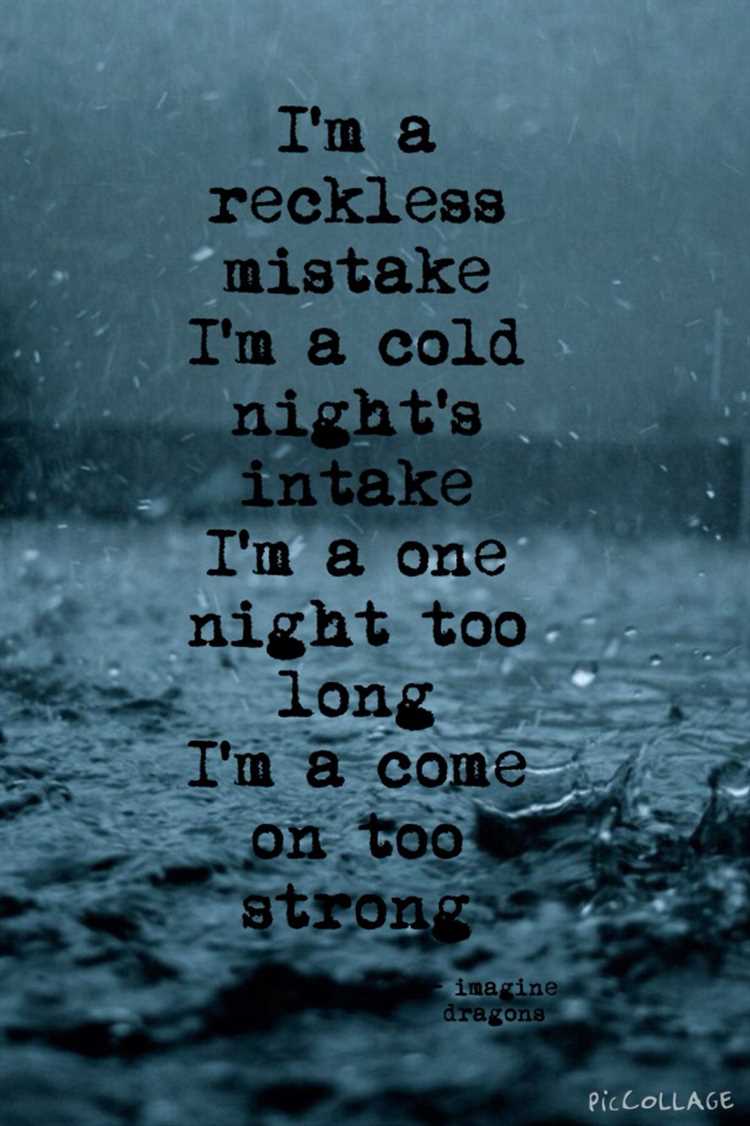Quoting lyrics from a song can add an extra layer of meaning and emotion to your writing. It can help convey a message, set a mood, or provide context to your work. However, it’s important to quote lyrics correctly to avoid copyright infringement and give credit where it’s due. In this step-by-step guide, we’ll take you through the process of properly quoting lyrics from a song.
Step 1: Choose the Right Lyrics
Before you can start quoting lyrics, you need to select the right ones for your purpose. Consider the theme or message you want to convey and find lyrics that align with that. It’s also important to make sure the lyrics are relevant to your overall content and will enhance your writing rather than distract or confuse the reader.
For example, if you’re writing a heartfelt blog post about love and relationships, you may choose lyrics from a romantic ballad that captures the essence of your message.
Step 2: Use Quotation Marks
When quoting lyrics, it’s essential to use quotation marks to indicate that you are quoting someone else’s work. Place double quotation marks (“”) around the lyrics to clearly separate them from your own writing. This visually indicates to the reader that you are quoting lyrics from a song.
For instance, if you wanted to quote the lyrics “And I will always love you” from Whitney Houston’s song, you would write: “And I will always love you”.
Step 3: Provide Attribution
In addition to using quotation marks, it’s crucial to give credit to the songwriter or artist whose lyrics you are quoting. This helps to acknowledge their creative work and gives them the recognition they deserve. Include the artist’s name and the song title in your attribution to provide the necessary context for the reader.
For example, if you’re quoting lyrics from Ed Sheeran’s song “Thinking Out Loud,” you would write:
“And, darling, I will be loving you ’til we’re 70” – Ed Sheeran, “Thinking Out Loud”.
By following these steps, you can properly quote lyrics from a song while respecting copyright laws and giving credit to the artist. Remember to select the most appropriate lyrics, use quotation marks, and provide attribution in your writing to enhance the impact of your work.
Why quoting lyrics correctly is important
Quoting lyrics correctly is important for several reasons:
- Respect for the artist: Quoting lyrics correctly shows respect for the artist and their work. By accurately attributing the lyrics to the original songwriter and providing proper citation, you acknowledge their creative contribution and give them the recognition they deserve.
- Legal compliance: Quoting lyrics without permission from the copyright holder can infringe on their rights. By quoting lyrics correctly, you ensure that you are within the boundaries of fair use and avoid potential legal issues.
- Accuracy: Quoting lyrics correctly ensures accuracy in your references. It allows others to easily verify the lyrics and find more information about the song if they are interested.
- Avoiding misinterpretation: Quoting lyrics correctly helps to prevent misinterpretation. By using the exact words of the songwriter, you eliminate any ambiguity or confusion that could arise from paraphrasing or misquoting the lyrics.
Overall, quoting lyrics correctly not only demonstrates respect for the artist but also ensures legal compliance, accuracy, and clear communication of the intended meaning. It is an essential practice when using lyrics in any form of media, whether it’s an article, a blog post, or any other type of content.
Understanding copyright laws
When quoting lyrics from a song, it is important to understand the copyright laws that govern the use of creative works. Copyright is a legal protection granted to the creators of original works, such as songs, books, and movies. It gives the creators the exclusive right to reproduce, distribute, and display their work.
Quoting lyrics from a song without proper permission or attribution can be considered copyright infringement. To avoid legal issues, it is best to follow these guidelines:
- Obtain permission: If you plan to quote lyrics from a song, it is advisable to seek permission from the copyright holder. This can be the songwriter, the music publisher, or the record label.
- Use fair use: In certain cases, the use of copyrighted material may be deemed fair use. Fair use allows for limited use of copyrighted material for purposes such as criticism, comment, news reporting, teaching, scholarship, or research.
- Provide attribution: When quoting lyrics, it is important to give credit to the original songwriter. This can be done by including the songwriter’s name and the song title in your quotation.
- Limit the amount: To avoid copyright infringement, it is important to limit the amount of lyrics you quote. Quoting a few lines is generally considered acceptable, but quoting an entire song may be problematic.
It is worth noting that the laws regarding copyright can vary depending on the country. Therefore, it is important to familiarize yourself with the copyright laws of your specific jurisdiction.
| Type of License | Description |
|---|---|
| Creative Commons | A type of license that allows the free distribution and use of creative works, often with certain restrictions. |
| Sync license | A license required to synchronize music with visual media, such as movies, TV shows, or commercials. |
| Mechanical license | A license required to reproduce and distribute a copyrighted musical composition. |
| Performing rights license | A license required for public performance of a musical composition, such as in a concert or on the radio. |
By understanding and respecting copyright laws, you can ensure that the use of song lyrics in your quoted content is legal and ethical.
Step 1: Determine the purpose of the quote
In order to properly quote lyrics from a song, it is important to first determine the purpose of the quote. This will help you decide how to incorporate the lyrics into your own work and what kind of attribution may be necessary.
Here are a few common purposes for quoting song lyrics:
- Illustrating a Point: If you are using lyrics to support or reinforce an argument or idea, it is important to choose lyrics that are relevant and provide context for your message.
- Analysis or Critique: If you are discussing or critiquing a song, you may want to include specific lyrics to support your analysis. Make sure to choose lyrics that are representative of the song’s overall message or theme.
- Evoking a Mood or Setting: Sometimes, song lyrics can help set the tone or evoke a specific mood in your writing. When using lyrics for this purpose, it is important to choose lyrics that create the desired atmosphere.
Once you have determined the purpose of the quote, you can move on to the next step in the process of properly quoting lyrics from a song.
Step 2: Select the appropriate lyrics
Once you have determined the purpose and context of your quote, it is time to select the appropriate lyrics to include. Keep in mind the following guidelines:
- Choose a meaningful and relevant lyric: Look for a line or phrase that captures the essence of the song or reflects the message you want to convey.
- Avoid selecting excessive or lengthy lyrics: Keep your quote concise and focused. It is best to choose a short phrase or a few lines that pack a punch.
- Avoid offensive or controversial lyrics: Make sure the lyrics you select are appropriate for your intended audience and do not contain offensive language, explicit content, or controversial themes.
Here is an example of how to select the appropriate lyrics:
| Song: | “Imagine” by John Lennon |
|---|---|
| Context: | Writing an article about promoting peace and unity |
| Appropriate lyric: | “Imagine all the people living life in peace.” |
In this example, the chosen lyric perfectly captures the message of promoting peace and unity, making it an ideal quote for the article.
Remember to always consider the purpose, context, and appropriateness of the lyrics you choose to quote and ensure they align with your intended message.
Step 3: Use proper quotation marks
When quoting lyrics from a song, it is important to use proper quotation marks. This is an essential step to ensure that the lyrics are clearly distinguished from the rest of the text.
There are two types of quotation marks that can be used: single quotation marks (‘) and double quotation marks (“). In general, double quotation marks are more commonly used in writing.
Here are a few examples of how to incorporate proper quotation marks when quoting lyrics:
- Use double quotation marks around the entire lyrics:
- Use double quotation marks for the lyrics and single quotation marks within the lyrics:
- Use single quotation marks for the lyrics and double quotation marks within the lyrics:
| Incorrect: | I’m gonna make you “sweat, sweat, sweat” |
| Correct: | I’m gonna make you “sweat, sweat, sweat” |
| Incorrect: | “I’m gonna make you ‘sweat, sweat, sweat'” |
| Correct: | “I’m gonna make you ‘sweat, sweat, sweat'” |
| Incorrect: | ‘I’m gonna make you “sweat, sweat, sweat”‘ |
| Correct: | ‘I’m gonna make you “sweat, sweat, sweat”‘ |
By using proper quotation marks, you can ensure that the lyrics are accurately represented and easily identifiable within your writing.
Step 4: Include the artist and song title
Quoting lyrics from a song is not complete without mentioning the artist and the song title. This step is crucial in giving credit to the original creator and providing proper context to the quoted lyrics. Here’s how to include the artist and song title:
- Artist’s name: Start by mentioning the artist’s name before the quoted lyrics. This can be done by using the artist’s full name or their stage name, depending on what they are commonly known as.
- Song title: Follow the artist’s name with the title of the song in which the lyrics appear. It is important to accurately mention the title to avoid any confusion or misrepresentation.
When including the artist and song title, there are different formatting options. Here are a few examples:
- Example 1: “I don’t want to miss a thing,” Aerosmith
- Example 2: “Let it Be” by The Beatles
- Example 3: In the song “Bohemian Rhapsody” by Queen, Freddie Mercury sings, “Is this the real life? Is this just fantasy?”
Remember to use quotation marks around the lyrics and italicize the song title. You can also add additional information such as the album name or the release year if it is relevant to your context or discussion.
| Correct Format | Incorrect Format |
|---|---|
| “Someone Like You” by Adele | “Someone Like You” (Adele) |
| In “Shape of You” by Ed Sheeran, the opening lyrics are “The club isn’t the best place to find a lover” | In the song “Shape of You” by Ed Sheeran, the opening lyrics are “The club isn’t the best place to find a lover” |
By including the artist and song title, you are acknowledging the original source and properly attributing the lyrics to the rightful creator. This step is essential in maintaining integrity and respect for the artist’s work.
Step 5: Provide proper attributions
When quoting song lyrics, it is important to give proper credit to the artist, songwriter, and any other relevant contributors. This not only shows respect for their work but also ensures that you are abiding by copyright laws.
Here are the key elements you should include when providing attributions:
- Artist name: Start by mentioning the name of the artist or band who performed the song. This is usually the most recognizable and important attribution.
- Song title: Follow the artist name with the title of the song being quoted. Make sure to use proper capitalization and punctuation.
- Album or release information: If applicable, include the name of the album or release where the song can be found. This provides additional context and helps your readers locate the original source.
- Composer and songwriter: If you have access to this information, it is always good to attribute the composer and songwriter of the song. This acknowledges their creative contribution and gives them proper credit.
Here is an example of how you can properly attribute song lyrics:
| Artist | Song Title | Album | Composer/Songwriter |
| The Beatles | Hey Jude | Hey Jude | John Lennon, Paul McCartney |
It is important to note that the required attributions may differ depending on your specific use case or the guidelines you are following. Always refer to the relevant copyright laws and guidelines to ensure you are providing accurate and complete attributions.
Question and answer:
Do I need to get permission to quote lyrics from a song?
Yes, you generally need permission from the copyright holder to quote lyrics from a song. This can usually be obtained by contacting the music publisher or copyright owner.
Can I quote lyrics from a song in my book without permission if I give credit to the artist?
No, giving credit to the artist is not sufficient to avoid copyright infringement. You still need permission from the copyright holder to quote lyrics from a song, even if you give credit.
How should I format lyrics when quoting them in my writing?
When quoting lyrics from a song, you should use quotation marks around the lyrics and attribute them to the artist and song title. Additionally, you should include a proper citation for the source of the lyrics, such as the album name and release year.
What should I do if I can’t find the copyright holder to get permission to quote lyrics?
If you are unable to locate the copyright holder to obtain permission to quote lyrics, it’s best to err on the side of caution and not include the lyrics in your writing. Using copyrighted material without permission can result in legal consequences.


